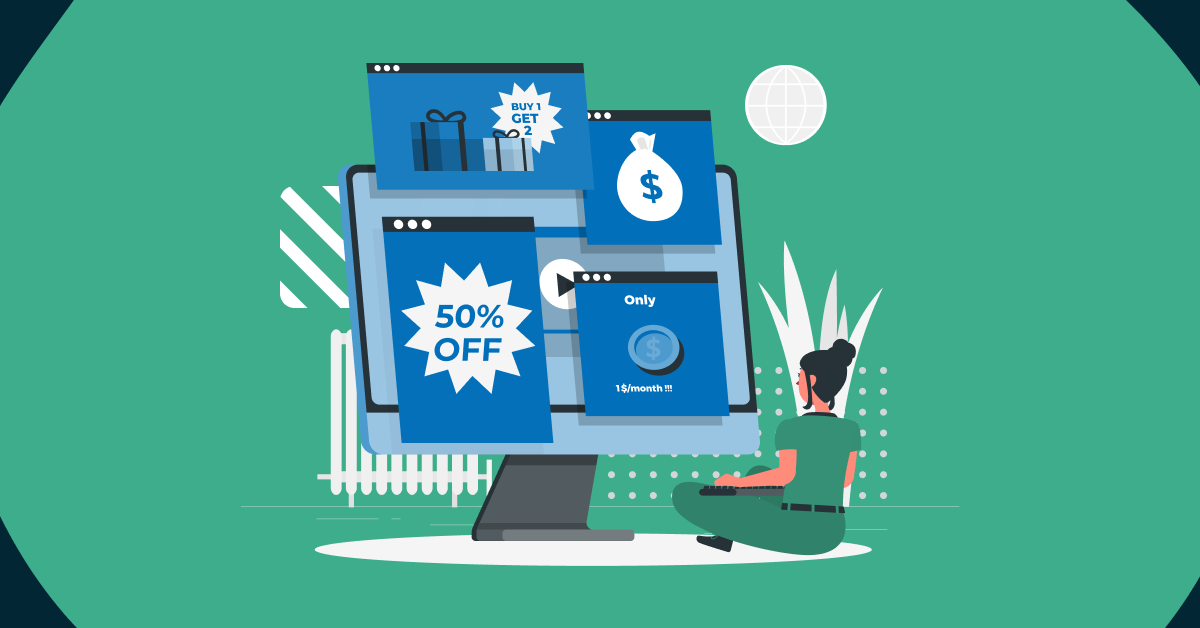Suppose you have launched a fantastic eCommerce store that sells reasonably priced excellent products and offers free delivery. It sounds like a perfect plan to welcome a significant audience to your store, doesn’t it?
However, there is a teeny tiny problem, how would people know that your store exists? If people are unaware of the existence of your store, your eCommerce store will not earn any profits.
Marketing comes to the rescue when a business wants to inform, attract, or convert its prospects. In the fast-paced era, where millions of online companies exist, solid and sound marketing strategies have become an essential tool.
Without marketing, no business can survive in the highly competitive eCommerce world regardless of its size. If you want to take your business to new heights of success, it’s high time that you brush up on your marketing skills.
A massive marketing campaign can cost a fortune to a business. Ecommerce giants can easily splurge to run a wide-scale marketing campaign. On the contrary, small businesses or startups cannot invest a hefty amount in their marketing campaigns.
But, it shouldn’t scare you away from marketing your brand to the targeted audience! You can market your business and attract new customers without breaking a bank. Here’s how you can do it:
All you have to do is keep reading today’s article, as it contains a list of low-budget digital marketing ideas that will help you grow your startup business.
Ready? Let’s dive in!
Here Are The Low Budget Digital Marketing Tips To Scale Your Startup Business
1. Email Marketing
 The first digital marketing strategy to grow your startup business is to integrate emails into your marketing campaigns. Many people find email marketing bizarre in the era of social media. However, email marketing is quite effective and allows the marketer to create highly targeted content for each category of prospects. This advantage is not available to the marketer in social media marketing.
The first digital marketing strategy to grow your startup business is to integrate emails into your marketing campaigns. Many people find email marketing bizarre in the era of social media. However, email marketing is quite effective and allows the marketer to create highly targeted content for each category of prospects. This advantage is not available to the marketer in social media marketing.According to a study conducted by McKinsey and Company, email marketing is approximately 40% more effective than social media marketing. Moreover, the study revealed that email marketing also increased the average order value by 17%.
Encourage the visitors on your website to sign up for the newsletter. Offer them a gift, discount code, or free downloadable or printable material to make them share their email addresses with you.
Once you have received the email addresses, make sure to divide your subscribers into different categories based on their genders, ages, location, interests, previous purchases, etc. Think and design emails to target each category effectively. Set a schedule to send the emails to your subscribers. That way, your subscribers would know when to expect to hear from you. Sending emails once or twice a week is enough; sending catchy emails more than that will let the user unsubscribe from the mailing list.
Create unique and compelling content to email your subscribers. Think of a short, concise, and catchy subject line to make your subscribers open the email and skim its contents. Moreover, don’t forget to attach the link to your website and social media handles in emails. Make it easy for your prospects to reach your website and social profiles with just a single click or tap.
2. Social Media Marketing
Did you know that there were 3.96 billion active users on social networking sites in 2020?
Just as people are familiar with the search engine giant Google, they are familiar with the popular social networking sites like Facebook, Instagram, Twitter, etc. There are billions of users on these networking sites, giving the brands and companies the perfect opportunity to market themselves and promote their products to a large audience.
The presence of businesses on social media is no longer ‘nice to have; instead, it is ‘must to have.’ Entrepreneurs that are not present on social networking sites are doing a disservice to their businesses and missing out on tons of benefits that their brands can enjoy.
The best thing about social media is that it is absolutely free for everyone to join. People or companies are not required to pay any sort of registration or monthly membership charges to create their profiles on these sites.
Create your business profile on famous sites such as Facebook and Instagram to increase brand awareness and market your brand to a mass audience. Upload high-resolution and attractive images to catch your users’ attention and compel them to engage with your content.
Are you wondering how you will manage various social accounts? No problem! Thanks to the latest technology, you can use social media management tools to post your content on all platforms simultaneously.
3. Google Ads
Are you surprised to see Google ads in the list of low-budget marketing ideas to grow your startup business?
Relax! Google ads are neither going to drain your budget nor will they require you to rob a nearby bank.
Google can display your ads to the relevant audience, so the chances of conversion are better. Isn’t it great? Your ads will be displayed to the audience who is genuinely interested in your products. But this isn’t the best part of Google ads. The business will only pay when people click on the ad.
Yes! That’s right. You don’t have to pay anything to run the ads. Google will only charge when prospects click on the ads to land on your website or social media handles.
There are different types of ad formats to select from. Marketers can choose the appropriate pattern as per the requirements of their businesses and marketing objectives. Google ads appear on the result pages as well as on the websites that the prospects use or visits.
Marketers need not worry about skimming their targeted audience in the market. Google will do the job of finding and displaying the ads to the right audiences.
4. Boost Your SEO
This is another low-budget yet most effective digital marketing strategy to boost your sales and increase organic traffic on your eCommerce website.
Millennials and Gen Z head over to Google.com whenever they want to find answers to their queries.
Looking for the best restaurants in town? Ask Google.
What’s new in fashion? Find it on Google.
My mobile phone has drowned in the pool? Google will help you find a solution.
In short, Google has the answer to everything.
Did you know that Google receives 5.6 billion search queries every single day? A phenomenal number of users visit this website daily to seek solutions to their problems. Wouldn’t it be great if your website ranks higher in result pages and makes the prospective audience click your website? If yes, optimizing your website’s SEO will improve the ranking and visibility of your website on the SERPs (search engine result pages).
Optimize the content of your website by adding relevant keywords used by your prospects. Moreover, boost your website’s speed to decrease the bounce rate and rank higher. Similarly, make your eCommerce store responsive on various digital devices. If your website fails to load or run smoothly on mobile devices, you can lose a huge chunk of organic traffic.
5. Blogging
Regardless of your niche and the products you deal in, blogging can be of immense help to increase website traffic, earn people’s trust, and raise brand awareness.
The first benefit of blogging is that it allows you to answer the questions and concerns raised by your targeted audience. When you create and publish content that interests your audience or helps them find the solution to their queries, they perceive your business as an expert in the market. It compels them to learn more about your business and products.
Sharing your knowledge by publishing exciting articles will build a business’s credibility, along with boosting its SEO. Marketers can easily integrate the keywords used by prospects in their blogs to improve their visibility and ranking on search engine result pages.
Think of unique and interesting topics that align with your targeted audience’s interest to keep them hooked on your website and convert them into customers.
6. Run Retargeting Ads
 Suppose you have built an excellent website, started blogging, optimized SEO to increase website traffic. However, all these efforts will go in complete vain if visitors do not convert as customers on your website.
Suppose you have built an excellent website, started blogging, optimized SEO to increase website traffic. However, all these efforts will go in complete vain if visitors do not convert as customers on your website.According to research, 97% of first-time visitors do not convert on the eCommerce website. As an enthusiastic entrepreneur, you will not let go of 97% of the prospective audience, will you? If people visit your website and leave without purchasing anything, you need to go after them and remind them about the products that they explored.
Retargeting ads can help you remind the potential audience about your existence and remarket your products. Entice your prospects by displaying the products that they viewed or added to their carts to make them revisit your store.
7. Influencer Marketing
Influencer marketing is trending in the world of digital marketing. In a survey, 94% of marketers stated influencer marketing as an effective marketing channel.
Social media influencers are people who have a massive following on their social accounts. By collaborating with key influencers of your niche, you can introduce your brand to a vast audience and direct them to your eCommerce store.
Look for the micro-influencers of your niche and collaborate with them by creating a creative and interesting campaign to capture the audience’s attention and pique their interests to learn more about your brand.
Conclusion
There you have it…seven low-budget digital marketing tips to scale your startup business. Implement the above ideas to grow your startup business and boost your sales.
Ecommerce businesses do not grow overnight. It takes lots of hard work, effort, and consistency to reap fruitful results. Hence, stay dedicated and consistent to make your mark in the market.


